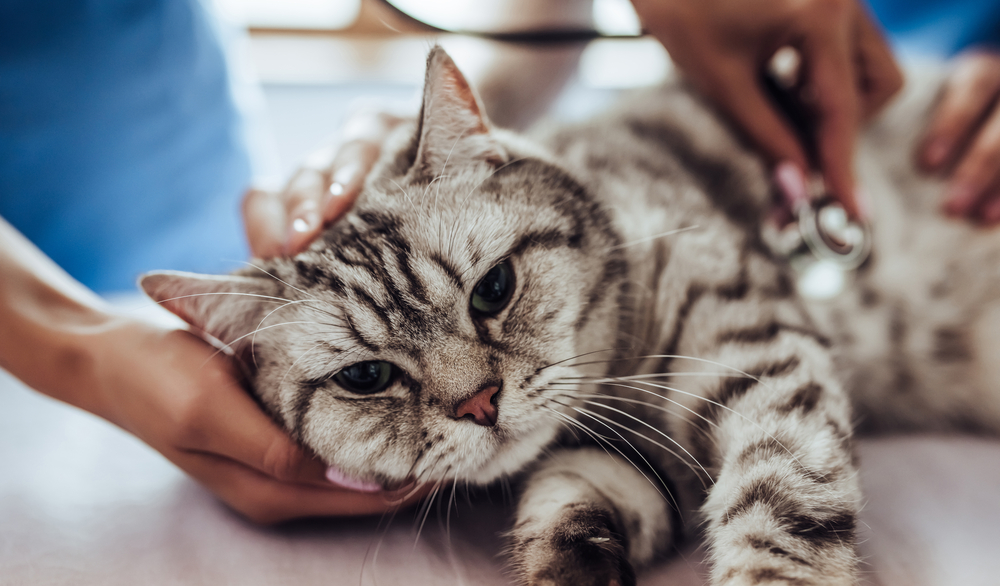
All pet species can suffer from viral infections, but cats are particularly prone to these illnesses. Viruses are often highly contagious and infected cats may or may not appear sick, allowing the disease to spread silently. Most cats are exposed to at least one common viral infection in kittenhood or young adulthood and some will carry that virus for the remainder of their lives.
The Urgent Pet Care Omaha team has dealt with our fair share of sick cats, and we know how viral infections can impact overall health. To help pet owners understand viral disease significance, we explore common viral infection signs and explain when you should seek veterinary care.
Common feline viral diseases
The most common feline viruses cause respiratory signs, including sneezing, coughing, runny nose, congestion, and eye irritation, or they result in long-term damage to the immune system.
- Feline calicivirus — FCV affects the respiratory system, causing typical “cold”-like signs, plus fever, lameness, or oral ulcers. Severe FCV can lead to pneumonia or death in kittens or adult cats with weakened immune systems.
- Feline herpesvirus — FHV-1 infects nearly all cats by the time they reach adulthood. The initial infection causes respiratory signs, but the virus then becomes dormant and can reactivate later in life. Reactivations are often brought on by stress or another illness and a few cats may suffer with chronic respiratory or eye problems.
- Feline immunodeficiency virus — FIV is a lifelong viral infection that weakens the immune system, similar to HIV in humans. Some cats live years without symptoms, while others develop chronic problems that can include weight loss, fever, recurring infections, blood disorders, and oral or eye inflammation. FIV is spread primarily through bite wounds, putting outdoor cats at high risk.
- Feline leukemia virus — This is another lifelong virus that suppresses the immune system. Cats with FeLV, which is true to its name, are more likely to develop various cancers than healthy felines. Other potential problems include anemia, infections, swollen lymph nodes, eye issues, or weight loss. FeLV is transmitted through close contact, such as grooming, or sharing food and water bowls.
- Feline enteric coronavirus — Exposure to FeCV is not problematic in most cats, but in a select few, the virus can mutate and cause a disease called feline infectious peritonitis (FIP). Cats with FIP are typically young and become ill quickly, with appetite loss, fluid buildup in the lungs or abdomen, or neurological dysfunction. FIP has not previously been treatable and always resulted in death, but new, effective treatments are on the horizon.
Feline viral disease prevention
FCV, FHV-1, and FeLV vaccinations, which are considered core vaccines, are available and recommended for all kittens and young adults. In older age, the FeLV vaccine is optional, based on a cat’s lifestyle. Pet owners should be aware that vaccinations don’t completely prevent all viral infections, but rather work to reduce disease severity, prevent recurrences, and reduce disease spread for a healthier feline population.
For diseases that vaccinations cannot prevent, keeping your cat’s environment clean and stress-free, providing good nutrition, and maintaining a preventive veterinary care schedule can go a long way. Do not house cats in crowded conditions, and keep cats indoors to avoid exposure to stray or feral cats who may harbor dangerous infections.
When to seek veterinary care for a sick cat

If you suspect that your cat may be suffering from a viral infection, call your primary veterinarian. In many cases, cats with mild illnesses can be managed and monitored at home. Cats who display more serious illness signs, including appetite loss, difficulty breathing, eye discomfort, or extreme lethargy, require more urgent veterinary care.
Treatment for viral infections is often supportive. Antibiotics cannot kill viruses, but antiviral drugs or eyedrops can help in select cases. Our veterinary team may also prescribe antibiotics for a cat with a suspected viral infection to prevent or treat secondary bacterial infections. Complications from FIV or FeLV are treated as they arise. For example, an FIV-positive cat who develops oral inflammation (i.e., stomatitis) may require tooth extractions.
We recommend first scheduling an appointment with your primary veterinarian, because they know your cat best. However, if you have immediate concerns about your cat’s health, contact the Urgent Pet Care Omaha team to obtain a convenient daytime, weekend, or late-night appointment.

